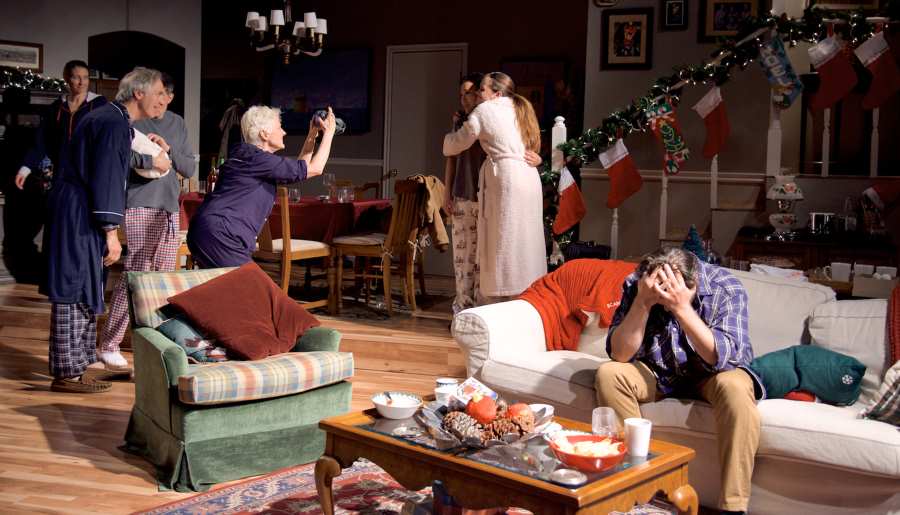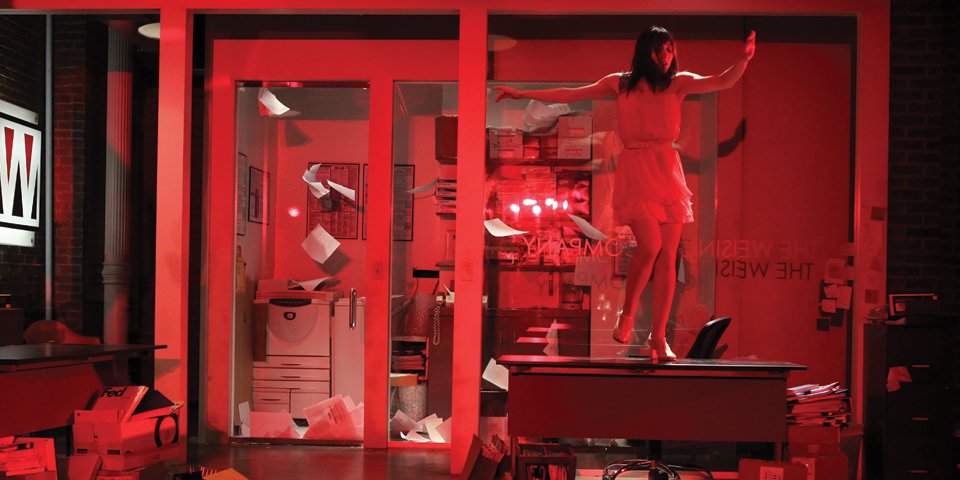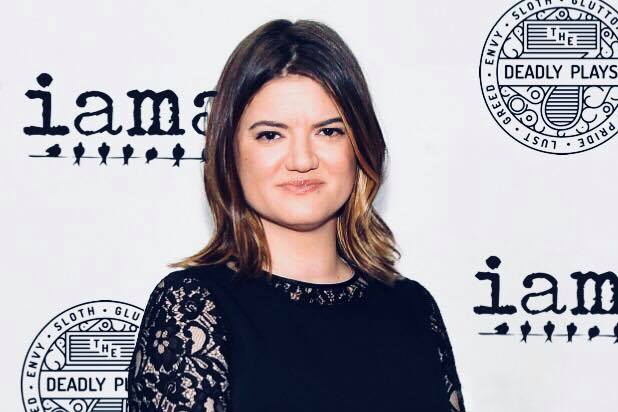It’s a series of plays 10 years in the making. In 2007, playwright Leslye Headland began writing a play called Cinephilia, about two twentysomething friends-with-benefits who shared a love of film but no love for talking about their relationship. That play laid the foundation for a series of plays from Headland roughly based on the seven deadly sins, “The Seven Deadly Plays.” Between 2007 and 2010, Headland managed to write six plays, covering a sin each (including Assistance, a thinly veiled memoir of her time working as an assistant to Harvey Weinstein, and the raucous Bachelorette). But she hit a snag with the final sin: pride.
She was 29 at the time, and to her pride “seemed like a good thing,” she recalls. Writing about the other sins—envy, lust, gluttony, et al.—was “exciting,” she says, and seemed like a natural vices to dramatize. But pride? “Pride was ‘fuck if I know,’” says Headland.
So she put the sin cycle on pause and did other things. She wrote other plays and made films (a 2012 film of Bachelorette starring Kirsten Dunst and Rebel Wilson, and Sleeping With Other People, 2015, starring Alison Brie and Jason Sudeikis). She’s currently the showrunner of the upcoming Netflix comedy series “Russian Doll,” co-created with Amy Poehler and Natasha Lyonne.
Then, two years ago, the leadership of IAMA Theatre in Los Angeles approached Headland about finishing the “Seven Deadly Plays,” to celebrate the 10-year anniversary of the theatre, which had produced the other six. Now 37 and having accumulated some accomplishments, she has a better grasp of what the sin of pride might be. This month IAMA is producing the world premiere of the final “Deadly” play, Cult of Love (through June 24).
“I came to the conclusion that the ‘sin’ of pride is saying, I’ve got the answer, I know what the answer is, the answer is ‘blank,’” she says. “To me that went straight to religion.”
For those who’ve never seen one of Headland’s “Deadly Plays,” don’t go in expecting a strong plot. Instead they’re what Headland calls “dirty dioramas”: character studies in bad behavior. Below she talks about this latest diorama, looks back on the other “Deadly Plays,” and expands on her recent tweets about her former boss, Harvey Weinstein.

What does pride look like in Cult of Love?
I was brought up in a very Christian household—I have a brother-in-law who’s an Episcopalian priest and another brother-in-law who’s a Princeton Seminary graduate, and then my parents. It seemed fitting that the end of this series would take a look at who thinks they have the answer, and whether or not that’s detrimental to themselves and people around them.
It’s about a family at Christmas, and it’s ostensibly going to be their last Christmas as a family together, and what that last Christmas looks like with adult children, when they start having their own children and they have their own families and their own beliefs.
I think all of the plays—they’re kind of all about these little prisons that these characters created for themselves that they can literally walk out of at any time. And the stories are just about them walking out of the prison, or choosing not to. Each play has a character who is the institutionalized character, like Regan in Bachelorette, Nick in Assistance—they’re kind of the character that is like, “I decorated my prison cell very nicely and I don’t need anyone to tell me it’s a prison.” And there’s usually a character who is just entering into it, who is not as institutionalized as the others—Gena in Bachelorette, Laura in Assistance—who kind of goes, “I’m trying to go along with it, but I’m not quite sure that I believe in it.”
I think Cult of Love is really similar. There are characters that really believe this is not a prison and that this family and this dynamic that they created is super healthy and super beneficial. And there are the characters that are questioning it and saying, “I don’t think love is enough. I think love without care and watering and tending to is very much like religious belief—it’ll just become stale.”
So now that you’ve gotten through all these “sins,” do you think they’re actually sinful?
I think they’re just normal. They’re what comes along with the baggage of being alive and sentient. I think the biggest mistake and transgression my characters can make is not changing. I think that the real “sin” is not changing. Of course people fuck up and of course you make mistakes, and the idea that you wouldn’t go, “Oh this isn’t okay, I’m leaving”—that’s when I wonder how lost those people actually are.
Looking back at these plays, do you see a different writer, or is it a natural progression of who you’ve become?
It does seem like a natural progression, like this awesome final conflagration of all of the anxieties that were leading up to it, all the things I felt so ashamed over.
Looking at them as a whole, it does feel like I’ve grown up into a person who doesn’t need to try something to know it’s not for me. I don’t need to spend X amount of years working as an assistant to know this is a bad fucking gig. I don’t need to do those things anymore to know that they don’t work. And I’m really grateful to be 37 and not 27 [laughs]. I’m so grateful to be the person that I am today, and to have learned all of those lessons mostly through writing them.

You wrote Assistance, another play in the series, based on the six years you worked at Miramax as an assistant. Has the downfall of Harvey Weinstein been a surprise to you?
Mostly it was surprising because, especially when I was writing Assistance and when I was working on it at Playwrights Horizons [Off Broadway], it was so interesting to get notes on the play. It was the kind of thing where I couldn’t really talk about specifics, given that I was an ex-employee of the company and having signed everything that I signed. I was getting all these notes about, “How do we end the play?” No one said it to me, but what they were really asking was: How do you beat Daniel? [The play’s Weinstein stand-in.] But in my head I was like, “You don’t.” That guy always wins. He bought my movie [Bachelorette] a month before that play opened.
When Jodi [Kantor’s] article came out, I was shocked by the reception to it, because I just thought men like that never go down. I was so shocked and so emboldened by the chorus of voices that brought him down. It makes me so happy—even saying that has been hard for me, because I’m still scared of him, to be honest. And I think that’s why a lot of women still have not said anything. I am so grateful to those women for speaking their truths and for standing up for themselves.
It’s women who brought down Weinstein, which is one reason why it’s frustrating that a Broadway producer asked David Mamet to write a play about him.
That was the real bummer about it. It doesn’t have to be me, but I don’t understand, there’s so many fucking female-identifying playwrights out there who can speak volumes about this—and [Mamet] is the plan?
Assistance also shows the culture that enables Weinstein-like behavior.
One hundred percent. At some point, I’ll probably speak a little bit more, when I have a little bit more clarity about what I can talk about.
When you’re in a traumatic situation like that, you reach out to the person next to you and they become your lifeline. And if that person starts behaving like the abuser, that’s when you start to go crazy and you start to believe all the phony stuff that you believe. You’re being asked to do things and you don’t know what they are—one moment you’re sitting at your desk and the next moment you’re on a plane and you’re in L.A. and you realize you don’t have a change of clothes, you haven’t showered in three days. It’s the relentless exhaustion of that kind of lifestyle.
And you’re being told that it’s glamorous and it’s this awesome thing that’s happening. But the reality is, this is bad. When someone is screaming at you, and a whole bunch of grown men are in the same room and don’t do anything, that tells you something right away about what kind of danger you may or may not be in. You’re like, “Oh, no one is going to stop this person. The only person that is going to make sure I don’t come to harm is me.”


